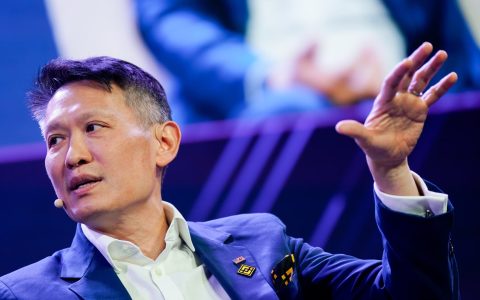
Nvidia CEO Jensen Huang listens to a reporter’s question during a press conference at the APEC CEO summit on October 31, 2025 in Gyeongju, South Korea.
Ezra Acayan | Getty Images News | Getty Images
Nvidia CEO Jensen Huang is pushing back against national security concerns surrounding the sale of his company’s advanced semiconductors to China, arguing that collaboration serves the best interests of all parties involved. His assertive stance comes amid escalating geopolitical tensions and increasing scrutiny of technology transfer between the U.S. and China.
Speaking to reporters in South Korea, Huang reiterated his commitment to maintaining access to the Chinese market, expressing optimism that the country will continue to seek U.S. chips as it solidifies its position as a global AI leader. “The way to think about the China market is, it’s a singular, vital, important, dynamic market, and nobody can replace that,” Huang stated.
“It’s in the best interest of America to serve that China market. It’s in the best interest of China to have the American technology company bring … technology to the China market … It’s in the best interest of both countries, and I hope that policymakers will ultimately come to that conclusion.” Huang’s perspective highlights the complex interplay between economic opportunity and national security considerations, particularly in the strategic semiconductor sector.
These comments arrive against the backdrop of U.S. export controls designed to restrict Chinese firms from acquiring cutting-edge semiconductors essential for AI development. The U.S. government asserts that these measures aim to limit China’s access to advanced chip technology and its ability to produce such chips independently, thereby curbing its progress in related computing and AI applications.
Former President Donald Trump addressed the issue of Nvidia chip exports in discussions with Chinese President Xi Jinping, although the most advanced Blackwell GPUs were not specifically included. Trump characterized the situation as primarily “between [China] and Nvidia,” with the U.S. acting as a “sort of the arbitrator.”
When questioned about the potential sale of Blackwell GPUs in China, Huang responded optimistically, deferring to the decision-making authority of the U.S. President.
However, Huang contends that the national security concerns surrounding chip exports to China are overblown. He argues that China possesses significant domestic chip manufacturing capabilities and has ample access to domestically produced chips, mitigating the impact of U.S. restrictions.
“China makes plenty of AI chips themselves, and the Chinese military surely have plenty of access to chips that are created in China. So, whatever national security concerns, have to take into consideration the fact that China has blocked H20 [an Nvidia chip] and, so, in a lot of ways, China is saying that, ‘listen, we have plenty of AI technology ourselves’,” Huang told CNBC.
“And so the national security concern, from that perspective, I think, is really answered by the fact that China doesn’t want H20 or any American chips.”
Huang’s eagerness to tap into the Chinese market is understandable given its vast potential. He estimates the market opportunity in China to be “probably $50 billion this year” and potentially “a couple of 100 billion dollars by the end of the decade.” This substantial market size underscores the economic stakes involved in the ongoing tech rivalry between the U.S. and China.
The Huawei Factor: Competition and Innovation
Another focal point of U.S.-China tech tensions is the Chinese telecommunications giant Huawei. Huawei faces restrictions in the U.S., including a ban on federal use of its products and limitations on U.S. firms conducting business with the company, due to concerns about potential espionage.
While Huang maintains that Nvidia holds a significant lead in the chip race, he emphasized the importance of acknowledging Huawei’s capabilities and competitive spirit. “It is foolish to underestimate the might of China and the incredible, competitive spirit of Huawei,” Huang said.
“This is a company with extraordinary technology. They dominate the world’s 5G telecommunication standards and technology. They build amazing smartphones, they build amazing chips, they’re incredible at networking and so when they announced CloudMatrix, I was not surprised that they were able to create such an amazing thing,” Huang said, referring to Huawei’s large-scale AI supercomputing system.
Huang’s comments highlight the dynamic nature of the global technology landscape, where competition drives innovation and companies constantly strive to gain a competitive edge. Huawei’s advancements in areas like 5G and AI demonstrate China’s commitment to technological self-sufficiency and its growing influence in the global technology arena.
“It’s deeply uninformed to think that Huawei can’t build systems. We take competition very seriously. We respect the competition, we respect deeply the capabilities of China. That’s why we run so fast, and that’s why we dedicate ourselves to inventing the future so we can get there before anybody else,” he added.
Original article, Author: Tobias. If you wish to reprint this article, please indicate the source:https://aicnbc.com/12057.html



